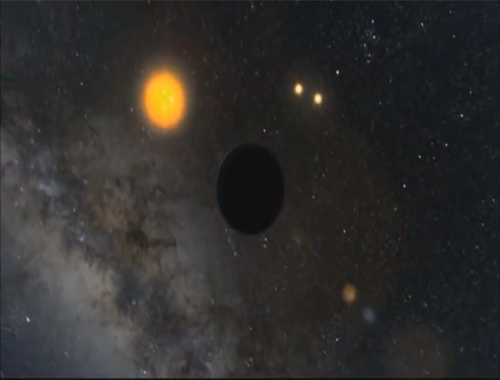Chapter Two: Signs (‘Ayata’)
- Details
- Hits: 4488
Chapter Two: Signs (‘Ayata’)
One of the ways, which God introduces Himself is through His creatures which in the terminology of Quran are known as Ayats, signs and reminders.[25]
The reason that these creatures are called as Ayats is that they are all the signs of God's existence and His attributes and the motive of remembering them is that contemplating and reflecting over them will cause one to remember the innate Ma'refat of God.
It is necessary to mention a few points with regards to this chapter:
First Point: As said before, in many verses of Quran God mentions guidance to be one of His Actions confined to Himself and in the traditions too, the Ma'refat of God is reckoned to be the make of God where no one plays any role in it.[26] By paying attention to this matter it can be said that not only has God created the creatures of the world but has originated them in the form of Ayat and sign of His existence and Attributes. Therefore, the existence of the creatures and their being a sign are both from God and He introduces Himself and His Attributes through them (i.e. creatures). Thus in some of the verses of Quran, God introduces Himself as the Demonstrator of Ayats (signs):
(*)
“We will soon show them our signs in the Universe and in their own souls, until it will become quite clear to them that it is the truth” (Holy Quran: Fusselat: 53)
In another place, after mentioning the wonders of creation it says:
(*)
“And He shows you His signs: which then of Allah's signs will you deny?” (Holy Quran: Ghafir: 81)
(*)
“Do you not see that the ships run on in the sea by Allah's favour that He may show you of His signs? Most surely there are signs in this for every patient endurer, grateful one.” (Holy Quran: Luqman: 31)
Basically, in the logic of religion, man does not find God through his own imagination and confirmation. Rather God has manifested Himself either directly or through the signs of creation and man only perceives this manifestation and remembers God and thereafter he uses this same manifestation in the form of words and expresses them and occasionally uses them in reasoning and argumentation. On this basis, the Ma'refat (gnosis) of God which is acheived through journey of the horizons and the self also is the donation of God,[27] not the creation of man. Therefore, man is helpless in explaining the essence of that Ma'aref too and only confesses that the Wise and All-Knowing, Mighty and Powerful, Compassionate and Merciful God is outside the two boundaries (boundary of negative theology and simile) and that He is not in any way similar to the creatures in Essence and Attributes.
Second Point: Many Quranic verses and traditions reckon the true Ma'refat (gnosis) of God to be the same Ma'refat which was given to man in the past worlds and which the people have evidentally succeeded in witnessing God and His Attributes by heartly vision and are (still) capable enough to remember that Ma'aref in this present world.[28]
From this point we draw this conclusion that the outcome of true ways of theology cannot be against the innate Ma'refat. Rather it should terminate in the same Ma'refat. As such, the Ayats and signs all lead to the remembrance of innate Ma'refat and for this reason the verses of Quran, after mentioning the wonders of creation, reckon the result of observation and contemplation to be reminding and remembrance:
(*)
“And of everything we have created pairs that you may be mindful.” (Holy Quran: Zaariyaat: 49)
(*)
“And what He has created in the earth of varied hues; most surely there is a sign in this for a people who are mindful.” (Holy Quran: Nahl: 12 & 13)
(*)
“We have made it a reminder&” (Holy Quran: Waaqe'aa: 73. Similarly Ghafir: 13; Ghasheya: 17-21 and A'ala: 1-10)
Third Point: An important matter, which exists with regards to reminding of the creatures, is that the remembrance of God in this way is possible through contemplation, reflection and intellection. This matter shows a fundamental difference between the first method of 'Tazakkur' (reminding) i.e. 'Severance' and the second method of 'Tazakkur' i.e. 'creatures'
To explain more, in the first method, by attaining severance, the innate Ma'refat is revealed upon man's heart and without any contemplation and partly without free-will and despite the inner desire, man pays attention to God and His attributes. However, in the second method, a person becomes reminded after pondering and contemplating in the created beings and their regularity and not in the Essence of God.
This matter shows the important position of contemplation and intellection in theology and one of the reasons as to why contemplation and intellection have been emphasized in divine religions is this very matter. Of course the intellect is having other significant roles which cannot be discussed over here.[29]
A point which is necessary to be discussed over here is that the way of contemplation and intellection in this method is different from the way which is propounded in the Greek philosophy because:
Firstly, intellection in Greece is done for discovering an unknown mental affair but over here, inasmuch as man is the bearer of innate Ma'refat and God too has made the creatures as His signs and (as) the path for paying attention and remembering the innate Ma'refat contemplation and intellection are therefore for the elimination of neglectfulness and (for) paying attention to the known and forgotten affairs, not for discovering the unknown.
Secondly, just as it was said in the first section, the manner of rationalization in Greek philosophy is only focused at the mental (rational) Universals and considering that the intellect is only capable of perceiving the rational Universals, it can therefore build for itself the Universals and or do abstraction and engage in their combination until the unknown matter is solved. In the matter of theology too, the manner of Greek rationalization first imagines God by paying attention to the philosophical system planned from before and later, with imaginations and confirmations, it makes clear the notion of God and engages in proving the same notion. However in the manner of divine rationalization the matter of imagination of God is not propounded at all and by pondering over the creatures, man becomes reminded and focuses itself to the heartly Ma'refat which is the outcome of the Action of God.
Of course, there exists other important and precise differences between the manner of philosophical rationalization in Greece and the manner of divine rationalization which itself requires a separate discussion.
Fourth Point: Another difference that exists between the first method (severance) and the second method (signs) is that in the former, the addressee is much more prepared in receiving guidance and in the words of Quran:
(*)
“…The oil whereof almost gives light through fire touch it not - light upon light.” (Holy Quran: Nur: 35)
As such, the one who engages in purification of his soul and keeps aloof from moral vices, his heart will be more ready in accepting the light and submitting before God. Therefore by reminding and remembering the conditions of “hardship and adversity” and severance, it pays attention to the innate Ma'refat and submits in front of this heartly proof and innate reasoning and expresses that it has seen God with all his existence.
However, the addressee in the second method enjoys less preparedness as compared to the addressee in the first method. Therefore the one who reminds should, through the channel of contemplation and intellection in the created signs and their regularity and through rational reasoning, prepare a person for reminding. Of course, those who possess hindrances for guidance and or are not at all wishing guidance belong to the group of addressee's of the second type. However reasoning in the verses of Quran are not propounded as reminding for them but as good dispute and argumentation.
Fifth Point: From the previous point another conclusion can be derived and that is: In addition to being a path for reminding and remembering God and innate Ma'refat, the creatures and the signs of creation are also a channel for reasoning together and disputing with the opposition and the obstinate (people) and with those who are faced with obstacles and difficulties in the path of guidance and or wish to seek reasoning and rational explanation about God.
In other words, the results and consequences of the signs of creation and reasoning in them are different because of the differences in the capability and preparedness of the people and the addressees. If in case the addressee wishes to seek guidance and is prepared to accept the reality then by pondering and contemplating in the signs of creation he will be reminded of the innate Ma'refat (gnosis) of God and in fact, contemplating in the creatures is instrumental in eliminating the veil and becoming heedful of the innate Ma'refat of God. If the addressee wishes rational proof for the existence of God, then by means of reasoning in the creatures and their regularity, he will confess in the existence of God and if there exists any intellectual obstacles in the path of guidance then by such reasoning, one can eliminate these obstacles. However, if the addressee is obstinate and has some other aim in mind, then by such kind of argumentation one can condemn him and impel him to surrender before the truth. Of course, rationalization in the Ayats (sings) is propounded as argumentation for the afore-said three persons.
Here it is necessary to say something about disputation and argumentation.











